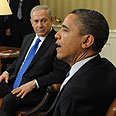
US on Iran: There is still time for diplomacy
White House spokesman Jay Carney says US believes 'there remains time and space' for efforts on sanctions to 'bear fruit' amid heightened tensions over Israeli demand for a deadline
Amid heightened tensions between Israel and the United States over Prime Minister Benjamin Netanyahu's demand for an American "red line" on the Iran nuclear issue, White House Spokesman Jay Carney said Monday that there is still time for diplomacy.
The US, he said, believes in an effort that is focused on punitive sanctions to isolate and pressure Iran and on diplomacy to bring about a change in behavior.
Related stories:
- US rebuffs Israel, says red line on Iran 'not useful'
- Can Israel still surprise Iran?
- J'lem officials slam Clinton's 'deadline' remark
"We believe that there remains time and space for that effort to bear fruit…” he told reporters at a news briefing.
Carney stressed that President Barack Obama is determined to prevent Iran from obtaining a nuclear weapon and shares this view with Israel.
“We share that view with Israel and Israel’s leadership in a way that has been made clear again and again. That’s why the president has pursued the policy that he has, that has put, together with our international partners, unrelenting pressure on Iran to abide by its international obligations and to forsake its nuclear weapons ambitions,” he said.
“But we’ve also made clear that the window of opportunity for reaching a solution by that means will not remain open indefinitely and that the president retains all options on the table in the pursuit of his commitment to prevent Iran from acquiring a nuclear weapon,” Carney asserted.
"The Americans are signaling that they will not be dictated to by Israel," an Israeli state official explained. He estimated that disagreements over the Iranian issue are part of the reason the US has yet to issue an official statement on a possible meeting between Netanyahu and Obama top be held on the sidelines of the UN General Assembly later this month.
It is possible that officials at the Obama campaign are worried that an unsuccessful meeting between the two could be politically detrimental to the president. "They are debating over the meeting fearing a bad one could result in a sour photo op which may affect the US elections," the state official said. "There is a very serious trust issue between the US administration and Netanyahu."
Over the past week it appeared as though both the prime minister and Defense Minister Ehud Barak made attempts to soften the rhetoric that pertains to a strike on Iran, evidently in order to allow the US and the international community an opportunity to step up pressure on the Islamic Republic.
But in the wake of the recent exchange, some state officials estimate tensions will rise again. They expect Netanyahu will respond to State Department Hillary Clinton's statements in order to illustrate the urgency of a need for a deadline.
Meanwhile, senior European officials have held brief visits in Israel recently to present their positions on the settlement issue as well as on Iran. Sources at the Foreign Ministry said this was nothing more than a formality as Europe understands it is not a factor in the debate on Iran which is solely between the US and Israel.
Former IDF Chief of Staff Dan Halutz also voiced his opposition to Netanyahu's demand from Obama. "I don't believe in red lines, because when the time comes red lines are no longer relevant because circumstances have changed," he said in Washington. "Global powers don't need to set red lines. An elephant doesn't need to set an ant a red line, he just crushes it."
Speaking at a J Street event, Halutz reiterated his position that Israel should not strike Iran alone, adding that any public debate between Israel and the US only benefits Iran. "We've talked too much and it's hurt our deterrence."
He further added, "We don't need to make a decision about an attack right now. I don't recommend attacking immediately, but we should never preclude it."
- Receive Ynetnews updates directly to your desktop










